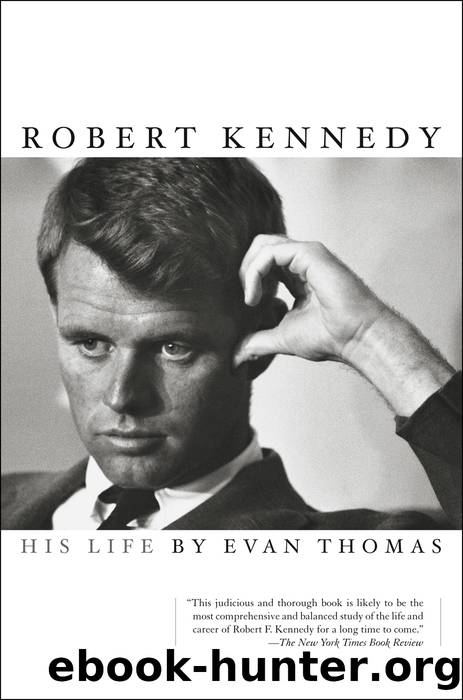Robert Kennedy by Evan Thomas

Author:Evan Thomas
Language: eng
Format: epub
Publisher: Simon & Schuster
CHAPTER 14 WORN
IN OCTOBER 1963, Robert Kennedy reversed himself again and gave the FBI authority to wiretap Martin Luther King. Kennedy’s signature became a hunting license for J. Edgar Hoover. The FBI not only tapped King at his office and home, it also bugged his hotel rooms. In January 1965, when King returned from Oslo after accepting the Nobel Prize, his wife, Coretta, opened a package mailed anonymously by the FBI. Inside were transcripts and tape recordings of King speaking lewdly and engaging in sex. A crude letter suggested that King kill himself.
In later years, friends of Robert Kennedy would sense the remorse he felt over Hoover’s grotesque smear campaign. John Seigenthaler recalled the “stricken” look in his eyes when RFK was asked in 1968 if he had authorized wiretaps on King. After his death, New York Timesman Anthony Lewis, Kennedy’s friend who had covered the Justice Department, described the “great distress” RFK felt over “Hoover’s extraordinary attack on Martin Luther King.” In Lewis’s description, RFK seemed more sorry than guilty. “Bobby’s reaction was, ‘Isn’t it awful? But isn’t it part of life? Isn’t it terrible that I can’t do anything about that?’ ” Kennedy’s attitude was not one of “violent fury,” Lewis told an interviewer in 1968. Rather, “it was just a sense of the wrongness of things that this kind of thing could happen; but there it was! He really couldn’t change it.”
Actually, he could have—but only if he had been willing to stand up to Hoover. On his own, as chief law enforcement officer, he might have challenged Hoover’s malevolent obsessions. But as guardian of his brother’s political future, his position was intrinsically compromised. He always had to think ahead, to contemplate how Hoover might exact revenge or bring pressure to bear in other ways. Kennedy’s aides suggest defensively that he authorized the taps by Hoover to resolve finally the question of King’s communist ties. But after twenty months of eavesdropping on the telephone conversations of the Kremlin’s alleged agent, Stanley Levison, the FBI had not produced a whit of evidence of communist influence on King. It is hard to see what was to gain by tapping King’s phone. There certainly was much to lose: Kennedy hesitated because he knew that if the taps were uncovered, the Kennedy administration would be disgraced in the civil rights movement. As Taylor Branch has noted, Kennedy had less reason to tap King in October than he did in July. In the interim, King’s “I have a dream” speech at the March on Washington in August had made Dr. King a hero to many Americans. And in September, the deaths of four little black girls in the bombing of a Birmingham church had created martyrs for King’s cause.
Kennedy was not personally sympathetic to King. In August, on the tapped phone of King’s adviser Clarence Jones, King was overheard talking lustily about loose women and the sexual habits of his colleagues. King worried that one of the organizers of the March on
Download
This site does not store any files on its server. We only index and link to content provided by other sites. Please contact the content providers to delete copyright contents if any and email us, we'll remove relevant links or contents immediately.
| American Revolution | Civil War |
| US Presidents |
Fanny Burney by Claire Harman(25784)
Empire of the Sikhs by Patwant Singh(22172)
Out of India by Michael Foss(16312)
Leonardo da Vinci by Walter Isaacson(11903)
Small Great Things by Jodi Picoult(6095)
The Six Wives Of Henry VIII (WOMEN IN HISTORY) by Fraser Antonia(4790)
The Wind in My Hair by Masih Alinejad(4424)
The Lonely City by Olivia Laing(4120)
The Crown by Robert Lacey(4105)
A Higher Loyalty: Truth, Lies, and Leadership by James Comey(4032)
The Iron Duke by The Iron Duke(3639)
Millionaire: The Philanderer, Gambler, and Duelist Who Invented Modern Finance by Janet Gleeson(3569)
Sticky Fingers by Joe Hagan(3454)
Alive: The Story of the Andes Survivors by Piers Paul Read(3310)
Papillon (English) by Henri Charrière(3269)
Joan of Arc by Mary Gordon(3258)
Stalin by Stephen Kotkin(3086)
Aleister Crowley: The Biography by Tobias Churton(3019)
Ants Among Elephants by Sujatha Gidla(2924)
